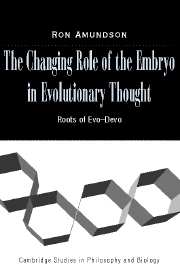Book contents
- Frontmatter
- Contents
- Acknowledgments
- 1 Introduction
- PART I DARWIN'S CENTURY: BEYOND THE ESSENTIALISM STORY
- PART II NEO-DARWIN'S CENTURY: EXPLAINING THE ABSENCE AND THE REAPPEARANCE OF DEVELOPMENT IN EVOLUTIONARY THOUGHT
- 7 The Invention of Heredity
- 8 Basics of the Evolutionary Synthesis
- 9 Structuralist Reactions to the Synthesis
- 10 The Synthesis Matures
- 11 Recent Debates and the Continuing Tension
- References
- Index
7 - The Invention of Heredity
Published online by Cambridge University Press: 05 June 2012
- Frontmatter
- Contents
- Acknowledgments
- 1 Introduction
- PART I DARWIN'S CENTURY: BEYOND THE ESSENTIALISM STORY
- PART II NEO-DARWIN'S CENTURY: EXPLAINING THE ABSENCE AND THE REAPPEARANCE OF DEVELOPMENT IN EVOLUTIONARY THOUGHT
- 7 The Invention of Heredity
- 8 Basics of the Evolutionary Synthesis
- 9 Structuralist Reactions to the Synthesis
- 10 The Synthesis Matures
- 11 Recent Debates and the Continuing Tension
- References
- Index
Summary
TRUISMS OF HEREDITY
The biological facts of heredity seem obvious to modern thinkers. We might suppose that the basic facts have been known forever. Among the truisms of heredity are these:
Offspring resemble their parents more than they do other members of their species.
Heredity is the passing of traits (or representatives of traits, such as genes) between generations.
Heredity is primarily a relation between parents and offspring.
Hereditary traits (those from our parents) are our deepest and most natural traits.
Heredity is independent of development.
None of these truisms is ancient. Truisms 2, 3, and 5 and were accepted by the scientific community only in the twentieth century. Truisms 1 and 4 were accepted in the nineteenth. During the eighteenth century, most experts would have rejected all five.
In this chapter I sketch the history of the concept of biological heredity and how we came to accept the truisms. My narrative is mostly progressivist; we have done a good job in discovering the facts. However, I take a “constructivist” stance on at least one issue. In the paragraphs that follow, I will claim that Truisms 2 and 5 are not discoveries but stipulations. At a certain point in history, heredity-theorists stood at a semantic crossroads. Two parties to a theoretical dispute claimed the legitimate ownership of the term heredity. With the victory went the semantic spoils: Heredity now means what the winners of that theoretical debate took it to mean. The winners were geneticists, and heredity now means genetics.
- Type
- Chapter
- Information
- The Changing Role of the Embryo in Evolutionary ThoughtRoots of Evo-Devo, pp. 139 - 158Publisher: Cambridge University PressPrint publication year: 2005

